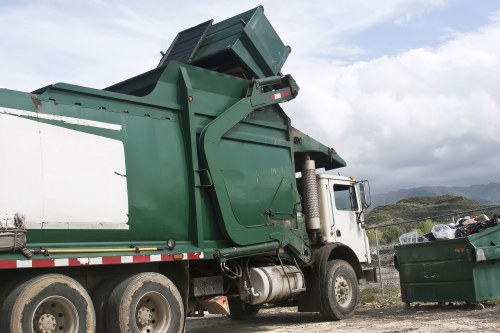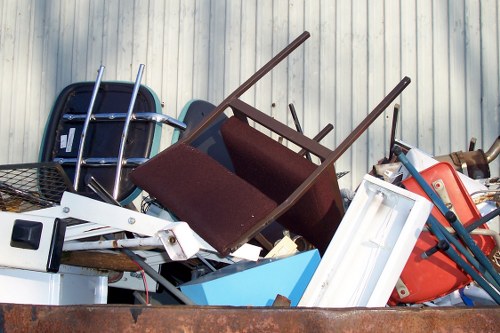Waste Collection in Little Venice

Little Venice, a picturesque area known for its serene canals and vibrant community, faces unique challenges and opportunities when it comes to waste collection. Efficient waste management is essential to maintaining the area's beauty and environmental health.
Proper waste collection not only keeps the neighborhood clean but also plays a crucial role in preventing pollution and promoting sustainability. Little Venice has implemented several strategies to ensure that waste is managed effectively.
From regular curbside pickups to specialized recycling programs, the waste collection system in Little Venice is designed to cater to the needs of its residents while minimizing the environmental impact.

Importance of Efficient Waste Collection
Efficient waste collection is vital for maintaining public health and preserving the aesthetic appeal of Little Venice. Accumulated waste can lead to unpleasant odors, attract pests, and create unsanitary conditions that are harmful to both humans and wildlife.
Moreover, effective waste management helps in reducing the overall carbon footprint by ensuring that waste is disposed of properly and recycled when possible. This contributes to a greener and more sustainable environment.
In Little Venice, the commitment to efficient waste collection reflects the community's dedication to environmental stewardship and quality of life.

Waste Collection Services Offered
The waste collection services in Little Venice are comprehensive and cater to various types of waste. Residential waste includes everyday household garbage, while commercial waste deals with waste generated by businesses and institutions.
Additionally, there are specialized services for hazardous waste, electronic waste, and organic waste, each requiring specific handling and disposal methods to ensure safety and compliance with environmental regulations.
Recycling programs are also a key component, encouraging residents to sort and recycle materials such as paper, glass, plastics, and metals to reduce the burden on landfills.

Challenges in Waste Collection
Despite the robust waste collection system, Little Venice faces several challenges. One major issue is the increasing volume of waste due to population growth and urbanization, which puts pressure on existing waste management infrastructure.
Another challenge is ensuring that all residents comply with waste segregation guidelines, which is essential for effective recycling and waste processing. Lack of awareness and participation can hinder these efforts.
Furthermore, the geographical layout of Little Venice, with its canals and narrow streets, can make waste collection operations more complicated and time-consuming.

Innovative Solutions for Waste Collection
To address these challenges, Little Venice has adopted several innovative solutions. One such solution is the use of automated waste collection systems that streamline the process and increase efficiency.
Smart bins equipped with sensors monitor waste levels and optimize collection routes, reducing fuel consumption and operational costs. This technology also helps in timely collection, preventing overflow and ensuring cleanliness.
Another innovation is the introduction of community-based recycling programs that engage residents in waste management activities. These programs not only promote recycling but also foster a sense of responsibility and community spirit.

Sustainability and Waste Management
Little Venice places a strong emphasis on sustainability in its waste management practices. By prioritizing recycling and composting, the community reduces the amount of waste sent to landfills and lowers greenhouse gas emissions.
Implementing zero-waste initiatives and promoting the use of reusable materials are part of the long-term strategy to achieve a more sustainable and environmentally friendly waste collection system.
Collaborations with environmental organizations and local businesses further enhance these efforts, providing resources and support for sustainable waste management practices.

Role of Community in Waste Collection
The community plays a pivotal role in the success of waste collection in Little Venice. Resident participation in waste segregation, recycling, and composting programs is essential for achieving the desired outcomes.
Educational campaigns and awareness programs help inform residents about the importance of proper waste management and how they can contribute. These initiatives foster a culture of responsibility and environmental consciousness.
Volunteer groups and local organizations also support waste collection efforts by organizing cleanup drives and providing assistance to those in need, strengthening the community's commitment to a cleaner environment.

Local Regulations and Policies
Regulations and policies are in place to ensure that waste collection in Little Venice adheres to environmental standards and promotes sustainable practices. These laws dictate how different types of waste should be handled, processed, and disposed of.
Compliance with local and national waste management regulations is mandatory for residents and businesses alike. Enforcement mechanisms, such as fines and inspections, help maintain adherence to these standards.
Additionally, policies encouraging recycling and reducing waste generation are instrumental in driving the community towards more sustainable waste management practices.

Technology in Waste Collection
Technology plays a significant role in modernizing waste collection in Little Venice. Innovations such as smart sensors in waste bins provide real-time data on waste levels, enabling efficient collection schedules and reducing unnecessary pickups.
Mobile applications allow residents to schedule pickups, report issues, and access information about recycling guidelines, enhancing communication between the waste management services and the community.
Furthermore, data analytics help optimize routes and improve the overall efficiency of waste collection operations, leading to cost savings and better resource utilization.

Impact on Environment and Quality of Life
Effective waste collection has a profound impact on both the environment and the quality of life in Little Venice. Proper waste management reduces pollution, conserves natural resources, and minimizes the negative effects of waste on ecosystems.
Clean streets and canals enhance the visual appeal of the area, making it a more attractive place to live and visit. This not only improves the well-being of residents but also supports local businesses and tourism.
Moreover, a well-managed waste collection system contributes to public health by preventing the spread of diseases and maintaining a hygienic environment.

Closest Areas to Little Venice
- Paddington: Located just north of Little Venice, Paddington offers extensive recycling facilities and community-driven waste reduction programs.
- Maida Vale: To the east, Maida Vale collaborates with Little Venice on joint waste collection initiatives, enhancing efficiency and coverage.
- Kensington: Southwest of Little Venice, Kensington benefits from advanced waste management technologies shared with Little Venice.
- Notting Hill: West of Little Venice, Notting Hill focuses on sustainable waste practices, including composting and organic waste recycling.
- Holland Park: Southeast, Holland Park supports Little Venice with additional resources for hazardous waste disposal.
- Maida Hill: Northeast, Maida Hill participates in community cleanup events organized by Little Venice.
- Regent's Park: Adjacent to Little Venice, Regent's Park offers green waste collection services in partnership with Little Venice.
- Westbourne Grove: Further west, Westbourne Grove collaborates on waste collection routes to optimize coverage.
- Queen's Park: Northwest, Queen's Park engages in joint recycling programs with Little Venice.
- Campden Hill: South of Little Venice, Campden Hill benefits from shared composting facilities.
- Notting Hill Gate: Northeast, Notting Hill Gate assists with residential waste management in coordination with Little Venice.
- Chalk Farm: Directly north, Chalk Farm supports Little Venice with additional waste collection manpower during peak seasons.
- St John's Wood: To the northwest, St John's Wood collaborates on hazardous waste disposal initiatives.
- Marylebone: Farther east, Marylebone benefits from Little Venice's recycling infrastructure.
Frequently Asked Questions
1. How often is waste collected in Little Venice?
Waste collection in Little Venice occurs on a weekly basis for residential areas, with additional pickups available for bulky items and special waste types as needed.
2. What types of waste are accepted in Little Venice's recycling programs?
The recycling programs accept paper, cardboard, glass bottles, plastic containers, and metal cans. Electronic waste and hazardous materials have separate collection protocols.
3. How can residents reduce their waste footprint in Little Venice?
Residents can reduce their waste footprint by practicing waste segregation, recycling materials, composting organic waste, and minimizing the use of single-use plastics.
4. Are there penalties for non-compliance with waste management regulations?
Yes, non-compliance with waste management regulations may result in fines or other penalties to ensure adherence to environmental standards.
5. How does technology improve waste collection in Little Venice?
Technology such as smart sensors and data analytics optimizes collection routes, monitors waste levels in real-time, and enhances communication between waste management services and residents.
